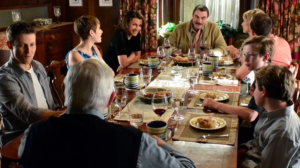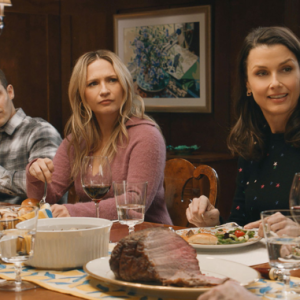Commentary: Selleck may not want to let Frank Reagan go, even after 14 seasons. But he has a much better character he should revisit instead.
Tom Selleck is not happy.
The “Blue Bloods” star does not understand why CBS is canceling the show after its 14-year run, considering how successful it still is.
“I’m kind of frustrated,” Selleck told TV Insider. “During those last eight shows, I haven’t wanted to talk about an ending for ‘Blue Bloods’ but about it still being wildly successful. In a Top 100 Shows of 2023-2024 (in total viewers, we were number 9 out of 100), if you discount the three football shows, we’re #6! I’m not going to turn into a bitter old guy saying, ‘Get off my lawn!’ I don’t believe in holding grudges, but if you were to say to the television network, ‘Here’s a show you can program in the worst time slot you got, and it is going to guarantee you winning Friday night for the next 15 years,’ it would be almost impossible to believe. My frustration is the show was always taken for granted because it performed from the get-go.”
Hey, at least for these final eight episodes of Season 14, you have eight family-dinner recipes (inspired by the Reagan family’s massive Sunday dinners on the show) to enjoy.
Those feasts, courtesy of “Blue Bloods” star Donnie Wahlberg’s brother Paul (who’s the chef for the Wahlburgers restaurant chain) may not be enough consolation for Selleck. But there’s a richer feast Selleck should turn to instead. A televisual feast.
Selleck needs to return to the character of Jesse Stone.

Who is Jesse Stone? Well, the character featured in a series of nine made-for-TV movies from 2005 to 2015, the first eight on CBS, the last one on Hallmark Movies & Mysteries, after CBS moved away from producing standalone movies. He’s a hard-drinking, deeply depressed ex-LAPD cop who was fired from the force after being drunk on the job. That career-killing error aside, he’s a good cop — and not just because he’s a maverick or willing to use extralegal means to bring perps to justice like so many TV cops. But because he’s someone who genuinely cares about the victims of horrible crimes (there’s a deep empathy in these TV movies, which, taken together, really do play like a series, down to their continuing storylines), and because he stands up to a lot of cop nonsense too: He uses a chainsaw to cut down a tree covering a speed limit sign that’s intentionally obscured so it can become a “speed trap” to bring in the sweet revenue of citations. He’d rather his police force be honest than use that as a way to make money.
After he’s fired from the LAPD, he takes a smalltime job as the police chief of fictional Paradise, Massachusetts, where the entirety of the TV movie series takes place (aside from occasional trips into Boston). Nova Scotia stands in for Massachusetts, and it has a leafy, brisk, maritime atmosphere that’s unique for cop-and-criminal shows.
But mood aside — and with its fog and sea-sprayed coastline, not to mention Jeff Beal’s contemplative piano-driven score, these movies have just about the best mood you’ll ever find on network TV — the character of Jesse Stone himself is unforgettable.
A complete depressive, Stone is so downbeat that he takes in a depressed dog (a golden retriever left without a master after his master is murdered) and seems to make the dog even more depressed throughout the course of the movie series. The later movies feature long conversations that bounce back and forth like tennis matches between Selleck and his therapist, played by William Devane. These put on display one of the defining features’ of this series: Its noir-like, repetitive dialogue, where certain conversational motifs keep popping up again and again — Jesse responding to someone saying “You’re cute, Jesse” with “Well, I am cute” happens at least three times — like witty rhymes. Or the way in which Stone always, somewhat passive aggressively, insists on everyone calling him Jesse.
He’s taciturn in an especially quirky way: In the prequel installment, “Jesse Stone: Night Passage,” which shows how he first arrived in Paradise, another character at a roadside diner asks him where he comes from. Stone just throws his thumb behind him at the road stretching off in the distance. Then the guy asks him where he’s going. Stone just points forward. Selleck wrote several of the teleplays for the later movies himself, and sank $1 million of his own money to ensure the last one, 2015’s “Lost in Paradise,” got made after CBS walked away from it.
This was a series about the quiet moments in police life. It wasn’t about action scenes (though there were some good ones, one even involving a deranged perp played by Stephen Baldwin!), as much as those moments where Jesse is driving through the rain and thinking about a case. Or pouring himself a glass of scotch, placing his gun on the counter, and sitting and thinking while firing up on the turntable Brahms’ 2nd Intermezzo in A-Major.
And then there’s the cast: Aside from Selleck and Devane (or perps of the week like Baldwin or Jane Adams), there was “Frasier” and “Unforgiven” alum Saul Rubinek as the town’s corrupt mayor, William Sadler as a Boston crime boss, Kathy Baker as an empathetic deputy, and, most astonishing for viewers watching now, Viola Davis in one of the roles in which many viewers first discovered her. She played a deputy working for Jesse in the first three movies, before going off to make “Doubt” and become one of Hollywood’s top stars.
The “Jesse Stone” movies were highly rated — the last one on CBS in 2012 drew almost 13 million viewers — but oddly, they might find an even more receptive environment now. If these aired on CBS in the era of the very last gasp of made-for-TV network movies, and still found success, it’s in luck: Standalone TV movies now have new currency. Look at how the “Star Trek” franchise is exploring the standalone movie format for its “Section 31” film on Paramount+. That streamer is in financial peril, as we all know, but its proclivity for original movies, and the success of “Tulsa King,” a series also built around an older icon in Sylvester Stallone, could be a good fit for a continuation of “Jesse Stone.” So could Prime Video, where the success of “Reacher” has shown the enduring appeal of especially character-oriented procedurals.
Now that “Blue Bloods” has ended, Selleck should do all he can to revisit Stone, one of his very best characters.





